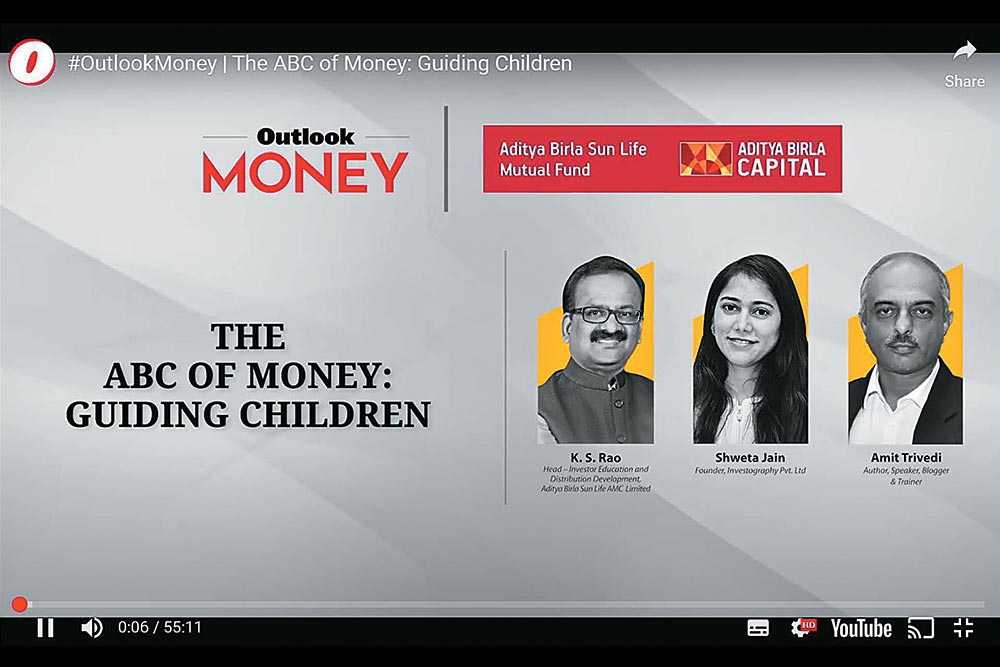Planning for children’s future is one of the most important goals for most parents. But what is equally important is inculcating the right financial and savings habit among children so that they can build a secure future for themselves when they are ready for it. A recent panel discussion, organized by Aditya Birla Sun Life Mutual Fund in association with Outlook Money, discussed this important aspect. The topic of the discussion ‘The ABC of Money: Guiding Children’. The panelists were K.S. Rao, head of investor education and distribution development at Aditya Birla Sunlife AMC; Amit Trivedi, an author, speaker, blogger, and trainer; and Shweta Jain, a certified financial planner and founder of Investography Pvt. Ltd. The panel was moderated by Nidhi Sinha, Editor, Outlook Money.
Start Early
Rao said that it is important to teach financial literacy at the school level but since that is not a reality, parents need to take up this challenge themselves. “Parents are the best teachers when it comes to values, whether it is about teaching the value of money or other values. to teach anything, and not only the value of money, but even moral and social values. They can lay the foundation for children.”
Guiding parents how they can go about it, he says that they can start with teaching them where money comes from. Starting with a piggy bank is still a good idea though things have changed over the years. “When elders and guests give money to children for their birthdays, festivals and other special occasions, they should be encouraged to save in the piggy bank,” he said.
Trivedi also highlighted the importance of starting early. “Even at a young age, send the child to the nearby shop, give the child some money and say, just go and buy whatever you want. That will help them learn how to manage money,” he advised. Also, when you trust the child with the money, they feel more confident, Trivedi added.
Be Innovative
It’s also important to be innovative when teaching children about money so that they engage with the concept more effectively.
“A lot of games can also be tried to teach such concepts. A good friend of mine who is also a financial planner used to play this game with his daughter. He had a transparent jar and he called it a chocolate bank for his daughter. So, whenever any guest came home with a chocolate, he would say put it in the chocolate bank. You can open the jar and eat one chocolate once a week. He taught her the concept of delayed gratification through this exercise. Also, it encouraged transparency since it was a transparent jar,” said Trivedi. When you see the jar filling up, it gives you a sense of satisfaction, which is what Trivedi’s friend was trying.
Have Conversations
“Start money conversations at a young age can teach them about earnings, where it is coming from, what kind of savings should be done, how spending works etc.,” said Rao.
Trivedi explained through an example. “When my son was eight, he saw a car and wanted to buy it. Since I don’t drive, I told him what will you do with it since you can’t drive it either until you turn 18. So why not save for it until then,” said Trivedi. This is how you can teach children to set goals, he added.
Jain feels that children in the current generation are smarter and more aware than the older generation as they are exposed to a world of information through the Internet and other means. “When your kids ask for something, talk to them about why they want it, what’s their utility etc., and they will understand,” said Jain.
Conversations can also help older children handle peer pressure. “We often think of peer pressure as negative but it can be positive too,” said Jain, whose son Ishaan, who is now 13, wrote a book about saving money for a dream vacation when he was just 11. She said that her son has a positive effect on his peers, who sometimes come to her and ask for advice on money.
Also, we can tell children to balance their present wants and future dreams. “Delayed gratification may not always make sense. You can’t just keep postponing everything for tomorrow and a balance needs to be maintained,” she said.
As they grow older, you can share the family budgets and even show them where you spend, said the experts. Kids should also be made aware about investing through mutual funds and other instruments through conversations, agreed the experts.

